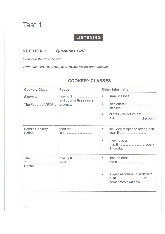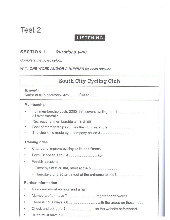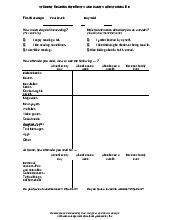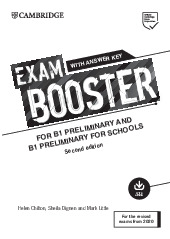





Preview text:
2ND EDITION ELEMENTARY ANSWER KEY 3.1 BIG HAPPY FAMILIES B have, has, have, has VOCABULARY FAMILY C 1A
1 ’s 2 ’ve 3 haven’t 4 hasn’t 3
Suggested answers: The mother is in the middle of the photo D
(wearing a red T-shirt) and the father is third from the left, at the
back. There are fourteen children in the photo. All the children are
1 Kate’s got five sisters.
sons or daughters and brothers or sisters (Ss should identify at
2 I’ve got a sister and two brothers.
least one of each). The parents are husband and wife.
3 They haven’t got a car. p
4 He hasn’t got a big family. B 4A e
Ss should circle the following words in Ex. 1A: parents, children, son,
daughter, brother, sister, husband, wife.
2 is 3 is 4 ’m 5 is 6 ’ve got 7 hasn’t got 8 isn’t 9 ’s got
10 ’m 11 ’ve got 12 ’re op PHOTOBANK p. 154 B 1A 1 (from left to right) Frank (A) and Maggie (B) 2 Top: Dad, Mum Ann (C) and John (D)
Middle: Andreas, Lisa 35, Paul 30, Me 27, Marek l 3 Robert (F) 4
Bottom: Eva, Vlad 3, Henryk 1 Ann (C) e 5 Mark (I) and Amy (J) 6 Katy (G)
LANGUAGEBANK 3.1 p. 132–133 7 Mark (I) A 1
Have 2 got 3 ’ve got 4 haven’t got 5 Have 6 got
8 Elizabeth (E) and Robert (F) 7
have 8 ’ve got 9 ’s got 10 have got 11 ’s got 9 Katy (G) and Jake (H)
12 ’s got 13 Has 14 got 15 ’s got
10 Mark (I) and Amy (J)
B 2 Have you got 3 Has your classroom got 4 Is your teacher
5 Are you 6 Have you got 7 Are you 8 Is your brother READING
9 Has your home got 10 Are the keys 2A SPEAKING Suggested answers:
big family: good: children always have company; they have to learn 5A
to share things/don’t get spoilt; clothes, toys, etc. are handed down
1 Have, got 2 have, got 3 Has, got 4 has, got and reused;
bad: expensive; children don’t have so many opportunities; don’t
have so much individual attention 3.2 REAL FRIENDS?
small family: good: more money/attention; parents have closer contact; SPEAKING
bad: children spoilt/given too much attention; children can be
lonely/fight each other more/be more competitive 1A Suggested answers: B
‘online’ friends: friends on the internet, e.g. on Facebook, Twitter or Suggested answers: other social networking sites A (the Radford family)
‘have fun’ friends: friends you do activities/go to social events 17: 17-seat minibus
with, e.g. play football, go running, go to the cinema, go to a party
9: 9 boys/sons in the Radford family;
‘real’ friends: close friends/best friends; friends you talk to about
9 bedrooms in the Radford house
personal things; friends who help you when you have a problem
7: 7 girls/daughters in the Radford family
3: Noel brings the children home at 3p.m. LISTENING
1: daughter Sophie has got a 1-year-old daughter, Daisy B (the Bonell family) 2A
600: food shopping costs $600 a week 2 a) 3 c)
16: 16 children in the Bonell family
9: 9 boys/sons in the Bonell family B
8: children help in the house from the age of 8
2 doesn’t want 3 thirty-five 4 doesn’t know 5 talks to
7: 7 girls/daughters in the Bonell family; 6 doesn’t see
7 bedrooms in the Bonell house
2: 2 children in neighbour’s family;
GRAMMAR ADVERBS OF FREQUENCY
the 2 oldest kids don’t live with the family 3A D
10% hardly ever 40% sometimes 60% often 80% usually
The Bonell family don’t all live together; all do housework together; like their big family. B
The Radford family have got a bakery; sometimes make pizza; like 1 after 2 before their big family. C
GRAMMAR HAVE/HAS GOT
2 Real friends always understand each other.
3 A real friend is sometimes a brother or sister. 3A
4 Real friends never ask about personal things.
1 have got 2 has got 3 haven’t got
5 Real friends hardly ever disagree.
6 Real friends are usually the same age.
Speakout Elementary Answer Key © Pearson Education Limited 2017 7 2ND 3 EDITION ELEMENTARY ANSWER KEY
LANGUAGEBANK 3.2 p. 132–133
3.3 ARE YOU FREE TONIGHT?
A 1 The students are never late.
VOCABULARY TIME EXPRESSIONS
2 They always do their homework.
3 It hardly ever rains here. 1A
4 We don’t usually watch TV in the morning.
2 a) 3 e) 4 b) 5 d)
5 I am sometimes very quiet.
6 We hardly ever eat meat. LISTENING
7 What time does the lesson usually finish?
8 The doctor is often here at half past seven. 2A
9 The boat tour never leaves from here. the cinema
10 Do you often go to that snack bar?
11 At the weekend Kim sometimes gets up at eleven. B
12 My watch isn’t always correct.
2 F Ron doesn’t like all the people in his office.
B 2 I always have breakfast with my family. 3 T
3 My father usually reads a newspaper on Sundays./
4 F They don’t agree to meet.
Usually my father reads a newspaper on Sundays. C
4 We’re often tired in the morning.
No. He doesn’t show any interest in Ron’s new job and he doesn’t ask
5 I hardly ever go to bed before 11p.m.
Ron any questions. His voice doesn’t sound interested (he has a very
6 I never drink coffee. flat intonation).
7 Nicola’s sometimes late./Sometimes Nicola’s late.
8 My sister often phones me in the evening. 3A
9 The hotel receptionist is always friendly.
1 half past five 2 the ABC cinema 3 six o’clock
10 The coffee here is never hot! B VOCABULARY PERSONALITY
Yes, because she asks Ron questions and responds to his comments in
a friendly way. She shows interest in him (see the sentences in bold in 4A the audio script below).
A talkative B intelligent C funny E friendly F kind Unit 3 Recording 6 B A = Amy R = Ron
serious – funny, boring – interesting, unfriendly – friendly,
quiet – talkative, unkind – kind A: Hello? R: Hi, Amy. It’s Ron. C
A: Oh, hi. How are you?
intelligent, serious, funny, boring, interesting, unfriendly, friendly,
R: Fine, thanks. And you? quiet, talkative, unkind, kind
A: I’m OK. How’s your new job?
R: Good. The people are very friendly … 5A A: Uh-huh.
2 really interesting 3 interesting 4 not very interesting
R: … and the work’s really interesting.
A: That’s great! C
R: It’s not perfect. I haven’t got my own office and my manager isn’t
2 I’m not very quiet. 3 I’m not funny. 4 correct very friendly.
5 I’m not (very) serious.
A: Oh, that’s a shame!
R: Yeah. Anyway, are you free tonight?
A: Yes, I think so. What would you like to do? TIP
R: How about going to the cinema? I want to see the new Jennifer
unhappy, unusual, unwell, unreal Lawrence film.
A: Sounds good. Where’s it showing?
WRITING DESCRIPTIONS; APOSTROPHE ’S R: At the ABC in town.
A: OK. What time does it start? 7A
R: Let me look. The film’s at six o’clock and at half past eight. What
Miguel’s an online friend of mine. We’re friends because we both like time’s good for you?
photography. Miguel’s photos are fantastic. He’s got a great camera.
A: I finish work at five, so six is good.
I don’t know a lot about his family, but I know he lives in Bogotá and
R: Right. How about meeting at, er, half past five at the cinema?
he’s got three children. His wife’s name’s Angelica. A: Yes, that’s fine.
R: Great! See you there. B
A: Yeah. Oh, how about asking Max?
has: He’s got a great camera; he’s got three children
R: Hmm. You call him!
is: Miguel’s an online friend; name’s Angelica A: OK. Bye.
possessive ’s: Miguel’s photos; His wife’s R: Bye. C
My best friend’s name’s Leo. He’s got a lovely wife, Klara, and they both LEARN TO SHOW INTEREST
work as actors in films and on television programmes. They live in an 4A
apartment in Moscow and have two children, Vera and Nikolay. Vera’s at Uh-huh.
school and she lives with them. Nikolay, Vera’s brother, is single and he That’s great!
lives and works in St Petersburg. He’s got a small apartment there. Leo Oh, that’s a shame!
likes talking, but Klara’s a quiet person, and very kind. B Uh-huh. (N) That’s great! (+) Oh, that’s a shame! (–)
Speakout Elementary Answer Key © Pearson Education Limited 2017 8 2ND 3 EDITION ELEMENTARY ANSWER KEY C
speakout a special occasion
Positive: wonderful, fantastic
Negative: terrible, awful 5B
1 C 2 D 3 A 4 B
FUNCTION MAKING ARRANGEMENTS C 5A
Ss should tick all the phrases (in bold in the audio script below). 1 Are 2 would you like Unit 3 Recording 10 3 going 4 showing
A: What’s a special occasion in your country? 5 What B: Hogmanay. 6 at
A: Hog … er … man … ? 7 What
B: Hog-man-ay. Let me tell you about it. OK, Hogmanay happens in 8 meeting
Scotland on New Year’s Day. In our families, on the day before
Hogmanay, we always clean the house – all day – because it’s
important to start the New Year in a clean house. Then, in the
LANGUAGEBANK 3.3 p. 132–133
evening, we usually have a big party with friends and family. At A 1 Are you
midnight we stand in a circle, join hands, sing Auld Lang Syne – 2 how
you know: ‘Should auld acquaintance be forgot.’ I think people 3 good for
sing this in a lot of countries now. We also have a special custom. 4 What would you
After midnight, the first person who visits the house gives 5 How about
presents to the family, usually shortbread or coal. This brings 6 on
good luck. Then we eat and drink. The party often goes on all 7 Sounds
night. I like it because all our friends and family come together 8 does, start
and it’s a great start to the New Year! 9 would, like 10 about meeting
writeback describing an event 3.4 DIWALI CELEBRATIONS 6A
in the evening, At midnight, Then, After midnight DVD PREVIEW 1 Suggested answers: 3.5 LOOKBACK
birthdays: make a cake, have a party
weddings: buy presents, throw rice FAMILY
Christmas: decorate Christmas tree, buy presents 1A
New Year’s Eve: go to a party, eat special food
1 grandfather 2 nephew 3 niece 4 aunt 5 father, uncle
wedding anniversaries: give someone a card, go to a restaurant 6 parents
graduation celebrations: go to a restaurant
housewarming parties: buy presents, dance ADVERBS OF FREQUENCY 2A 3A
2 g) 3 a) 4 h) 5 d) 6 b) 7 i) 8 j) 9 c) 10 f)
1 always 2 usually 3 often 4 sometimes 5 hardly ever 6 never 3 Suggested answers: PERSONALITY
1 the Festival of Light, because it is a time of colour and light 4A 2 the UK
2 talkative – quiet 3 friendly – unfriendly 4 serious – funny
3 more (a five-day event)
5 kind – unkind 6 interesting – boring DVD VIEW B 4A Suggested answers:
Activities from Ex. 2A: eat special food, give presents/gifts to each 1 doctor: friendly
other, watch fireworks, decorate your home, wear new clothes
2 parent: kind, intelligent
Other customs: clean rooms, wash money, buy gold and silver, throw
3 TV presenter: interesting, friendly, serious (depending on the
food and water on the ground, make a picture, visit parents and programme)
grandparents (and bow to show respect), send each other cards MAKING ARRANGEMENTS B
2 F (It lasts for five days.) 5A 3 T
Hi! Are you free tonight? Would you like to go clubbing?
4 F (She throws it in four directions.)
Great! How about the TX club? What time’s good for you? 5 T 6 T
7 F (People visit their parents and grandparents.) 8 T C
2 before 3 long 4 back 5 about 6 time 7 everywhere 8 everyone
Speakout Elementary Answer Key © Pearson Education Limited 2017 9 2ND EDITION ELEMENTARY ANSWER KEY 4.1 A PLACE TO STAY WRITING COMMAS 7A
VOCABULARY ROOMS AND FURNITURE
Sentence 2 is correct because there are commas between each item 1A
on the list, except the last one after and. 4
The website offers apartments to stay in. Ss might know websites B
such as Airbnb, Couchsurfing and HomeExchange, among many
1 There are three bedrooms, two bathrooms and a balcony. others. 2 no commas 2A
3 I get up at seven, have a shower, have breakfast in the kitchen p and go to work.
Rooms/Places: bedroom, bathroom, roof terrace, living room
Furniture: beds, sofa, washbasin, (big-screen) television VOCABULARY PREPOSITIONS la PHOTOBANK 8A p. 155
B on C in front of D behind E next to F under G above
1A 1 F 2 D 3 C 4 G 5 A 6 E 7 H 8 B 9 J 10 I c H between
11 K 12 F 13 Suggested answer: I/J B es
14 Suggested answer: C/H B bath n bed
p carpet l cupboard g chair b desk c
1 There are four books on the table. lamp i plant e rug q television h shower m sink f
2 There’s a table in front of the window. sofa j shelves d table a wardrobe r washbasin o
3 There’s a picture above the TV.
4 There’s a lamp next to the sofa. D
5 There’s a rug under the table.
6 There’s a picture behind the lamp.
a sofa, an armchair, a carpet, a cupboard, a shower, a wardrobe, a
table, a bedroom, a bathroom, a kitchen, an office, a terrace (They
are all two-syllable words and they are all stressed on the first 4.2 AROUND TOWN syllable.) LISTENING READING 3A 1B
the first apartment (Sunny room and sea views)
A post office (in Vanuatu). It’s unusual because it’s underwater.
A library (the Little Free Library) (in Pakistan). It’s unusual because B
it’s very small and you take a book from one place and give it back 2 ✓ in another place. 3 ✓
A cinema (the Sol Cinema). It’s unusual because it’s very small and
4 ✗ (There aren’t any buses late at night.)
they only show short films. It’s solar powered. 5 ✓
6 ✗ (It’s not a swimming beach.) C
2 L 3 C 4 PO 5 C 6 L
GRAMMAR THERE IS/ARE D 4A
2 a book 3 a film 4 a postcard 5 a library 6 a book
are, isn’t, aren’t, there, there 5A
VOCABULARY PLACES IN TOWNS
No, he isn’t a friend. He’s got an apartment and Jamie might stay 2A there.
post office, supermarket, school, bank, cinema, library B B
2 there are 3 There’s 4 there’s 5 there aren’t 6 There are
2 a post office 3 a library 4 a supermarket 5 a cinema
7 there isn’t 8 there’s
6 a theatre 7 a sports centre 8 a museum 9 a police station 10 a pharmacy
LANGUAGEBANK 4.1 p. 134–135 C
A 2 There are four chairs in the living room.
1 an art gallery 2 a post office 3 a cinema 4 a supermarket
3 There are two bedrooms in my flat.
5 a theatre 6 a sports centre 7 a pharmacy 8 a library
4 There isn’t a sofa in my living room.
9 a police station 10 a museum
5 There’s a bathroom upstairs.
6 There aren’t any shelves in the bathroom.
GRAMMAR CAN FOR POSSIBILITY
7 There’s a television in our kitchen.
8 There isn’t a garden. 3A
B 1 are there 2 Is there 3 are there 4 Is there 5 Is there possible 6 are there B C 2 Yes, there is.
3 There are three bedrooms (in my/our flat). can, can’t 4 No, there isn’t. C 5 Yes, there is.
6 There’s one bathroom (in my/our flat).
1 unstressed 2 stressed D
1 – 2 + 3 ? 4 – 5 ? 6 –
Speakout Elementary Answer Key © Pearson Education Limited 2017 10 2ND 4 EDITION ELEMENTARY ANSWER KEY C
LANGUAGEBANK 4.2 p. 134–135
1 No, thanks. I’m just looking.
A 2 Can you play tennis? 3 Can you smoke?
2 No, it isn’t right. Thanks anyway.
4 Can you take your dog? 5 Can you listen to music?
3 I’m not sure. I need to think about it.
B At the seaside hotel: b) you can play tennis.
c) you can’t smoke. d) you can’t take your dog.
e) you can’t listen to music. 4.4 FAVOURITE PLACES
At the beach apartment: f) you can cook.
g) you can’t play tennis. h) you can’t smoke. DVD PREVIEW
i) you can take your dog. j) you can listen to music. 1A
A Cape Town, South Africa VOCABULARY PREPOSITIONS
B the Masai Mara, Kenya
C the Iguaçu Falls, on the border of Argentina and Brazil 5A D Paris, France
2 B 3 D 4 C 5 E 6 F E Bangkok, Thailand
F the Grand Canyon, USA C
D supermarket A cinema E post office F sports centre B
2 A 3 E 4 F 5 B 6 C D
B theatre C museum G school H park DVD VIEW 3A 4.3 CAN I HELP YOU? 1 50 2 the Grand Canyon
VOCABULARY THINGS TO BUY B 1 need PHOTOBANK p. 156 2 open, warm 3 small
1 B 2 L 3 E 4 F 5 G 6 I 7 H 8 M 9 J 10 K 11 D 4 expensive
12 N 13 C 14 A 5 place 6 amazing 2B
(The answers are in bold in the video script.)
a sports shop: a football shirt, trainers, walking boots C
an electronics shop: a printer, a SIM card, a tablet (computer), a memory stick 1 friendly, awesome
a clothes shop: a sweater, jeans, a jacket, a T-shirt
2 amazing, romantic, exciting
3 wonderful, popular, interesting FUNCTION SHOPPING
speakout a favourite place 3A
1 B no 2 A SIM card, B yes 3 A trainers, B no 4 A nothing, B no 4B
• between Bolivia and Peru B • every year
1 19.99 2 8.99 3 120 euros 4 –
• go out to the lake in a boat and sometimes visit one of the islands
• likes the lake’s deep blue colour and it’s a great place to relax C
2 large 3 it 4 take C
Ss should tick all the phrases except I like it because it’s … and There’s D
always something … to do.
1 long 2 have 3 medium 4 are they
(The Key phrases are in bold in the audio script below.) Unit 4 Recording 12
LANGUAGEBANK 4.3 p. 134–135
One of my favourite places in the world is Lake Titicaca. It’s between
1 Have you got, in 2 Have you got, in 3 too big 4 How much
Bolivia and Peru and is, um, about four thousand metres above sea 5 expensive, Thanks
level. The water is always very, very cold. I go there every year with
my family and we stay in a small town near the lake. When I’m there,
I usually go out on the lake in a boat and sometimes I visit one of 4A
the small islands. Sometimes there are big waves on the lake but it’s
Yes. Have you got this sweater in size forty-two?
usually very quiet. So why do I like the lake? Well, I love its deep blue
Oh, it’s too big. Have you got it in size forty?
colour and it’s a great place to relax. Have you got it in black?
That’s too small. I’ll have the grey one.
writeback describing a place
LEARN TO SAY NO POLITELY IN A SHOP 5B 5A
No, thanks. I’m just looking. No, it isn’t right. Thanks anyway. a) 3
I’m not sure. I need to think about it. b) 1 c) 2
Speakout Elementary Answer Key © Pearson Education Limited 2017 11 2ND 4 EDITION ELEMENTARY ANSWER KEY
CAN FOR POSSIBILITY 4.5 LOOKBACK 4A ROOMS AND FURNITURE
1 Where can I buy a SIM card for my mobile? 2 Where can I sit? 1A
3 How can I say ‘beautiful’ in Italian?
1 armchair 2 bed 3 cupboard 4 shelves 5 sofa 6 wardrobe
4 Where can they watch the football match?
7 washbasin 8 television
5 Can my friend come to the lesson?
6 What can we do in the sports centre? PLACES IN TOWNS SHOPPING 3 1 post office 5A 2 cinema
1 Have you got these shoes in size thirty-six? 3 police station
2 They are too small. 4 supermarket
3 Have you got them in size thirty-four? 5 pharmacy
4 How much are they? 6 theatre
5 That’s too expensive. 7 museum
6 I’ll take them. 8 sports centre
7 No, it’s all right. Thanks anyway. 9 art gallery
8 I’m not sure. I need to think about it. 10 library
(secret message: I’m very hungry.)
Speakout Elementary Answer Key © Pearson Education Limited 2017 12




